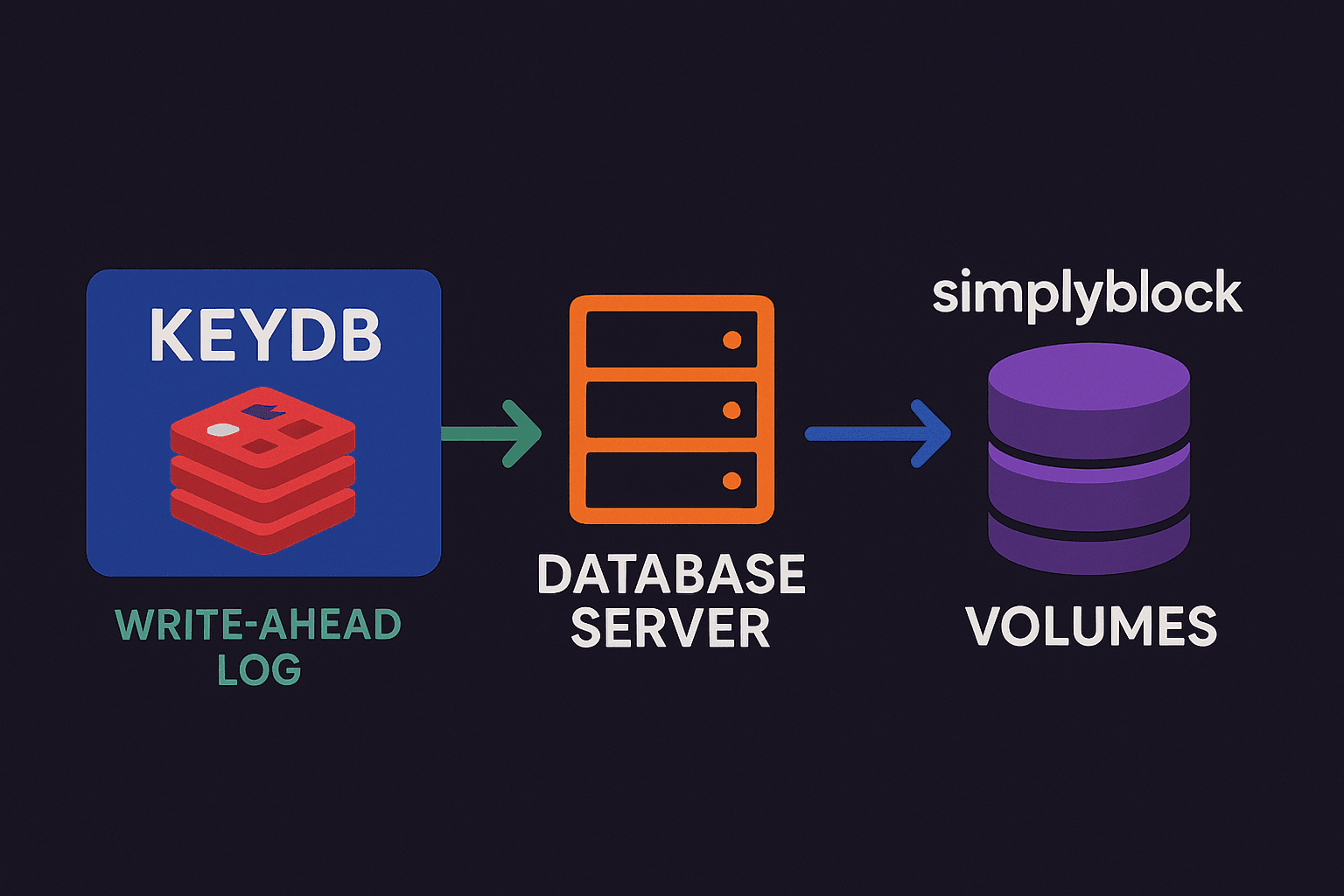KeyDB is an advanced open-source database compatible with Redis that supports active-active replication, multithreading, and high availability. While it is designed for in-memory speed, persistence is essential for durability and recovery. Without reliable storage, KeyDB can suffer from slow snapshots, replication delays, and potential data loss.
Simplyblock provides NVMe-over-TCP storage and zone-independent volumes to ensure that persistence in KeyDB is both fast and reliable. With this combination, workloads can scale while keeping data safe across distributed environments.
Addressing KeyDB Durability and Storage Bottlenecks
Although KeyDB is memory-first, persistence features such as AOF (Append-Only File) and RDB snapshots depend on disk performance. If storage is slow, AOF rewriting or snapshot creation can impact latency and throughput.
By pairing KeyDB with simplyblock, administrators gain high-throughput storage that maintains fast persistence operations without slowing down in-memory queries. Zone-independent volumes also ensure that KeyDB remains consistent in the event of node failures or rescheduling.
🚀 Use simplyblock with KeyDB for Reliable Persistence
Simplyblock delivers durable storage performance while supporting KeyDB’s advanced replication and persistence features.
👉 Use simplyblock for Cloud Cost Optimization →
Step 1: Provisioning Simplyblock Volumes for KeyDB
Start by creating and mounting dedicated simplyblock volumes to handle KeyDB persistence files:
sbctl pool create keydb-pool /dev/nvme0n1
sbctl volume add keydb-store 100G keydb-pool
sbctl volume connect keydb-store
Format and mount the volume:
mkfs.ext4 /dev/nvme0n1
mkdir -p /var/lib/keydb
mount /dev/nvme0n1 /var/lib/keydb
Update /etc/fstab to ensure the mount is persistent:
/dev/nvme0n1 /var/lib/keydb ext4 defaults 0 0

Step 2: Applying KeyDB Settings to Use Persistent Volumes
Once volumes are mounted, configure KeyDB to store AOF and RDB files on the simplyblock-backed directory:
In keydb.conf:
dir /var/lib/keydb
appendonly yes
appendfsync everysec
Restart KeyDB:
sudo systemctl restart keydb
Additional persistence options are described in the KeyDB persistence documentation.
Step 3: Scaling KeyDB Persistence Capacity
As KeyDB workloads expand, snapshots and logs will grow in size. Simplyblock allows administrators to scale storage without downtime:
sbctl volume resize keydb-store 200G
resize2fs /dev/nvme0n1
This ensures uninterrupted persistence operations. Cost control can be improved when paired with optimizing Amazon EBS volume usage.
Step 4: Achieving Zone Independence in KeyDB
KeyDB often runs in clustered deployments across zones. Standard storage tied to one zone complicates failover and scaling. Simplyblock volumes are zone-independent, keeping persistence files accessible even when nodes are rescheduled across different zones.
This capability strengthens high-availability strategies that align with reduction of RPO and RTO.
Step 5: Adding Storage-Level Replication to KeyDB
While KeyDB supports active-active replication, storage-level replication further enhances reliability. With simplyblock, volumes can be mirrored across zones:
sbctl volume replicate keydb-store –zones=zone-a,zone-b
This ensures resilience during infrastructure failures. Step-by-step instructions for configuring clusters are provided in the KeyDB cluster tutorial.
Scaling KeyDB Persistence in Enterprise Deployments
At enterprise scale, KeyDB deployments need persistence that is both efficient and easy to manage. Simplyblock simplifies storage management with CLI-based commands that reduce administrative overhead.
Capabilities such as simplification of data management improve operational workflows, while hybrid multi-cloud support ensures flexible deployments. Detailed configuration references are available in the simplyblock Documentation.
Other supported platforms
If you’re running in-memory or low-latency key-value data stores alongside KeyDB, Simplyblock also strengthens storage for:
Questions and Answers
Simplyblock boosts KeyDB persistence with NVMe-backed volumes that reduce latency and accelerate disk writes. This ensures KeyDB can handle intensive workloads with faster recovery and more predictable durability under load.
Yes, simplyblock supports KeyDB persistence in containerized setups by providing fast, reliable volumes via its CSI driver. Its Kubernetes backup solution helps safeguard persistent KeyDB data against failures.
Absolutely. With built-in replication and instant snapshots, simplyblock ensures KeyDB clusters can remain highly available and recover quickly from node or volume failures, making it ideal for mission-critical deployments.
Standard cloud storage often struggles with I/O bottlenecks under heavy write operations. Simplyblock delivers more consistent throughput and ultra-low latency, ensuring KeyDB persistence performs reliably even in high-traffic environments.
Simplyblock provides flexibility to run KeyDB across public clouds, private clouds, or on-prem environments. Its databases as a service support ensures cost-effective scaling without sacrificing durability or speed.

